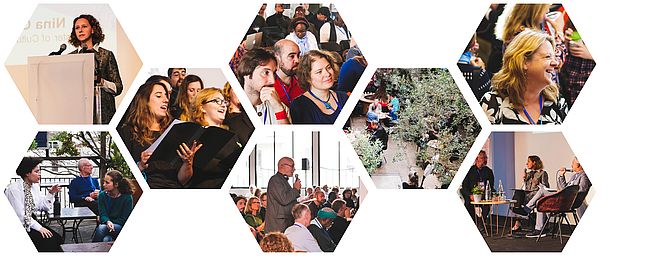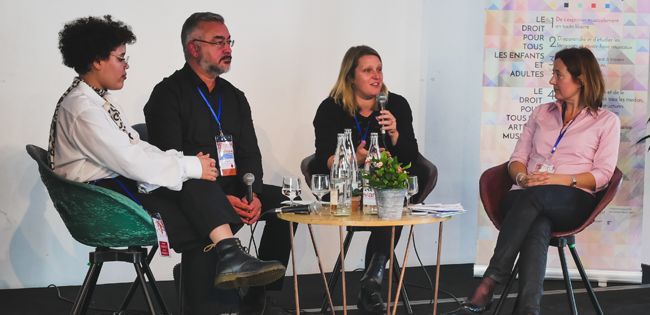
|
|
|
|
|
| |
|
The right for all musical artists ...
|
| |
|
|
|
| |

|
|
... to obtain just recognition and fair remuneration for their work
| The session on right number five shed light on the importance of giving just recognition to those at the core of the musical value chain, the authors and performers. It was curated by Alfons Karabuda (President of the International Music Council). In the panels, just recognition was described as not only credit for what one does but also the importance of being recognised and included in the eco-system even when you are not seen as part of the mainstream norm. Recognition is a prerequisite for fair remuneration and consciousness about the value of music: for artists, for listeners and society as a whole. |
| |
Discover our second newsletter on the 6th World Forum on Music organised last September in Paris, France.
More to follow! |
| |
|
|
|
|
|
Introduction to the Fifth Right
|
| |
|
|
|
| |
| The Minister of Culture of the Republic of Croatia Nina Obuljen Koržinek opened the session with a strong inspirational speech on the value of culture, which was followed by two panels illustrating why music and all the people working in the music sector are important. The debates also provided a glimpse of what the future technologies may bring to the sector and how they can support the musical eco-system. |
| |
|
|
|
|
|
|
|
|
|
Panel on Fair Remuneration
|
| |
|
|
|
| |
|
|
|
| The global musical eco-system was at the centre of the discussions in the first panel. Remuneration through streaming platforms was looked at and explained as in order for an artist to get his/her revenue the correct metadata needs to be inserted to a song. Metadata is important to identify the artist when his/her work is being streamed and only then correct payment is possible. |
| |
| Irfan Aulia (Indonesia) talked about how the Blockchain system could play an essential role to ensure that the artist gets paid for his/her work and how technology can be used to ensure just recognition. Authors and artists are often not aware of the need to identify their pieces through metadata before releasing their work, there is a gap of information that needs to be tackled. Putting wrong data into a system means that wrong data is put out even if using the latest technology. This is why it is crucial for those at the core of the value chain to register correctly. |
| |
| Solange Cesarovna shared her experience in Cabo Verde, where musical culture is rich, but has been poorly protected. Solange has actively worked to get a transparent collecting society in place and she is now slowly seeing a proper environment for the fair remuneration of creators being built in Cabo Verde. In December 2019, the morna music genre of Cabo Verde is likely to be included in the list of Intangible Cultural Heritage of UNESCO. |
| |
| Wally Badarou shared his vision for a common understanding of the value of music regardless of genre or region of origin. National borders of music are of less importance and new technology opens up for collaborations that never would have been possible before. In a fast moving development it is more important than ever though not to lose track of the value of music. A value well described in the IMC 5 music rights. |
| |
|
|
|
|
|
Knowing our Rights is Power
|
| |
|
|
| |
|
|
|
| |

|
|
| In this session, panellists talked about the importance of education with regard to obtaining fair payment for authors. The themes that emerged were mostly around unpaid work with examples like the British Musicians Union’s campaign ‘music is our profession, not a hobby’. The notion of fair pay was discussed as well as how to organise freelance musicians to collectively bargain for appropriate rates, terms, and conditions. |
| |
| Amber Watts highlighted just recognition not only as credit for what one does but also the importance of being recognised and included in the eco-system even when you are not seen as part of the mainstream norm. Examples were shown from the producer collective, Up-Front, that she co-founded. |
| |
| Vanessa Bertran stated that the level of protection of creators is quite uneven, but all face the same problem: creators are totally ignored by technological developments. Intellectual and creative content is no longer considered at its fair value and all struggle to remain professionals. The Copyright Directive, though imperfect and insufficient, was adopted by the European Parliament thanks to a massive mobilisation among creators. If the music sector wants to stand a chance to survive global digitalisation, it must get together and consider new global solutions. |
| |
| For Naomi Pohl, Deputy General Secretary of the British Musicians Union, fair pay was a primary focus. She also highlighted concerns about the lack of pension provision for freelance musicians in the UK and the related health / physical problems associated with working longer and not being able to afford to retire. |
| |
| The panel reminded the audience of the importance of networks in the music sector. |
| |
|
|
|
|
|
|
| |
|
|
|
| In general, the term metadata (or meta information) refers to data, which describes the characteristics of a specific piece of data, but is not actually the data itself. In music, an audio file is accompanied by metadata giving additional information about its content like BPM9, artist name, the song title, the composer, the other rights holders such as the publisher of the song and the record company, the finger-print of the recording, or an ISRC code10. |
| |
| Metadata are fundamental to precisely identify a recording or a song (think of covers, of live recordings, of the various arrangements than can exist of one song) and to determine who owns what in a musical work and/or a recorded performance and thus to collect and distribute revenue generated therefrom to their rightful owners. |
| |
The problem, schematically, is three-fold:
► there is a lack of metadata in the music as we consume it today, a trend that started with the commercial use of CDs and got worse with the advent of streaming;
► over the last 15 years, different organisations and companies have built their own proprietary metadata systems using different schemas, creating metadata “silos”;
► there is and has never been any control over the accuracy of data entries and it is common knowledge that errors and mistakes are populating all existing databases. |
| |
| As the consumption of music shifted to download then streaming, each supplier of metadata came up with its own schema/protocol. As a result, when an entity needs to communicate with another entity, tenuous crosswalks (schema translators) are required, or even manual entry. These crosswalks are still highly unsatisfactory and they don’t permit to distinguish between a good data and a bad data entry. |
| |
| | | | | | |
| |
|
|
|
|
|
|
| |
| Mr. Ottone noted that UNESCO and IMC share a common roadmap, that of providing a framework for reflection and action for the development of regulatory, political and legal frameworks necessary for the emergence of strong and dynamic cultural and creative industries. These industries, and notably the music sector, contribute to the achievement of the UN 2030 Agenda, on condition, however, of the recognition of the central role of artists whose creations constitute the raw material of those industries. |
| |
|
|
|
|
|
|
|
|
| |
|
|
|
| Among today’s challenges, Mr. Ottone pointed to the digital ecosystem that unsettles access and consumer habits and insidiously creates a kind of “free culture”. Only 13% of creators’ revenues come from digital exploitation. Artificial intelligence, the professional precariousness of artists and attacks on their freedom of expression constitute further challenges to which UNESCO aims to provide answers to, alongside governments and civil society. For example, UNESCO offers technical assistance to countries willing to develop legislation concerning the status of the artist. |
| |
|
|
|
|
|
|
| |
| Nina Obuljen Koržinek, the Minister of Culture of the Republic of Croatia, and Ernesto Ottone, Assistant Director-General for Culture of UNESCO, closed the session with an in-depth discussion. Their moderated conversation gave the participants a good insight into the cultural policy in practice at national and at UNESCO level and why it is crucial to safeguard artistic freedom around the world. |
| |
| Legislation faces difficulties to keep up with the pace of technological development. Therefore, it is even more important for the authors and performers to work closely together with the policy makers and legislators to create systems promoting new artistic creation. |
| |
|
|
|
|
|
|
|
|
|
|
|
You have received this newsletter because you subscribed to the Music World News and/or the EMC newsletter.
|
| |
|
|
|
|
|
|
|
| |
|
| |
You have received this newsletter because your are on the mailing list of the International Music Council. If you no longer wish to receive any emails from the International Music Council, please reply to this email writing "unsubscribe newsletter" in the subject line.
|
|
|
|